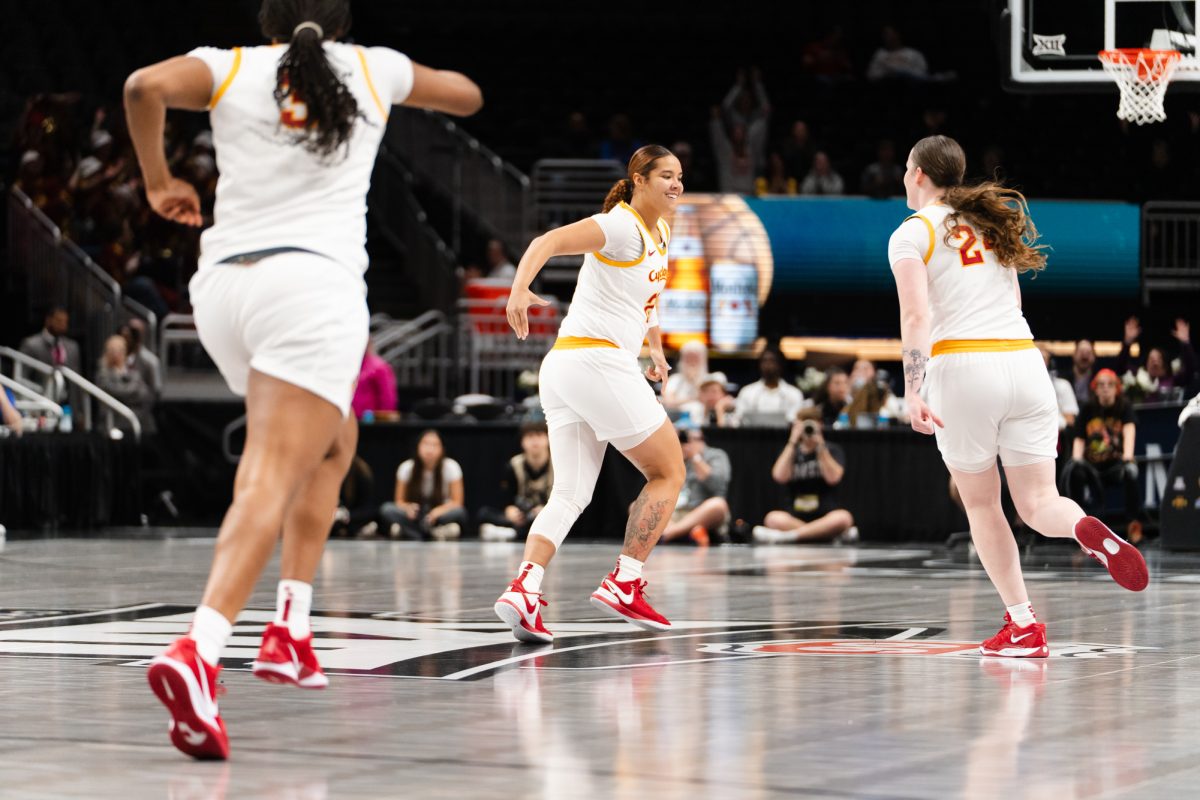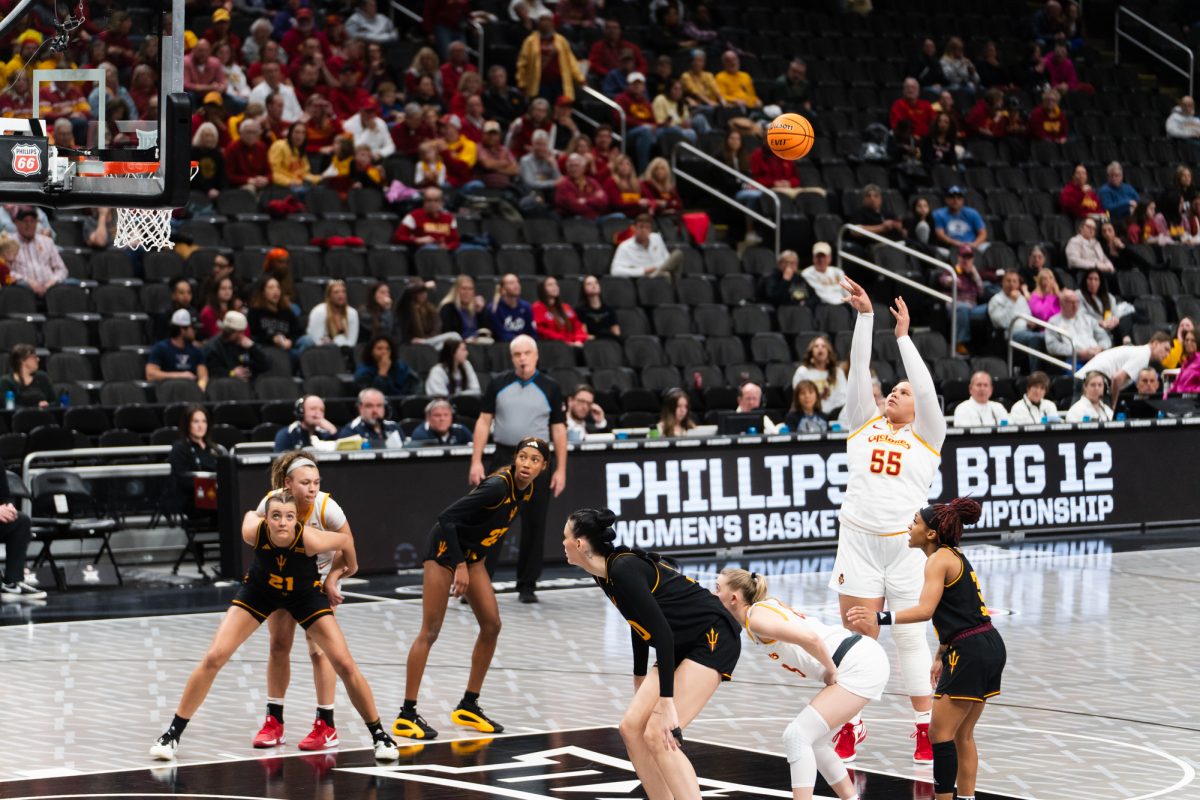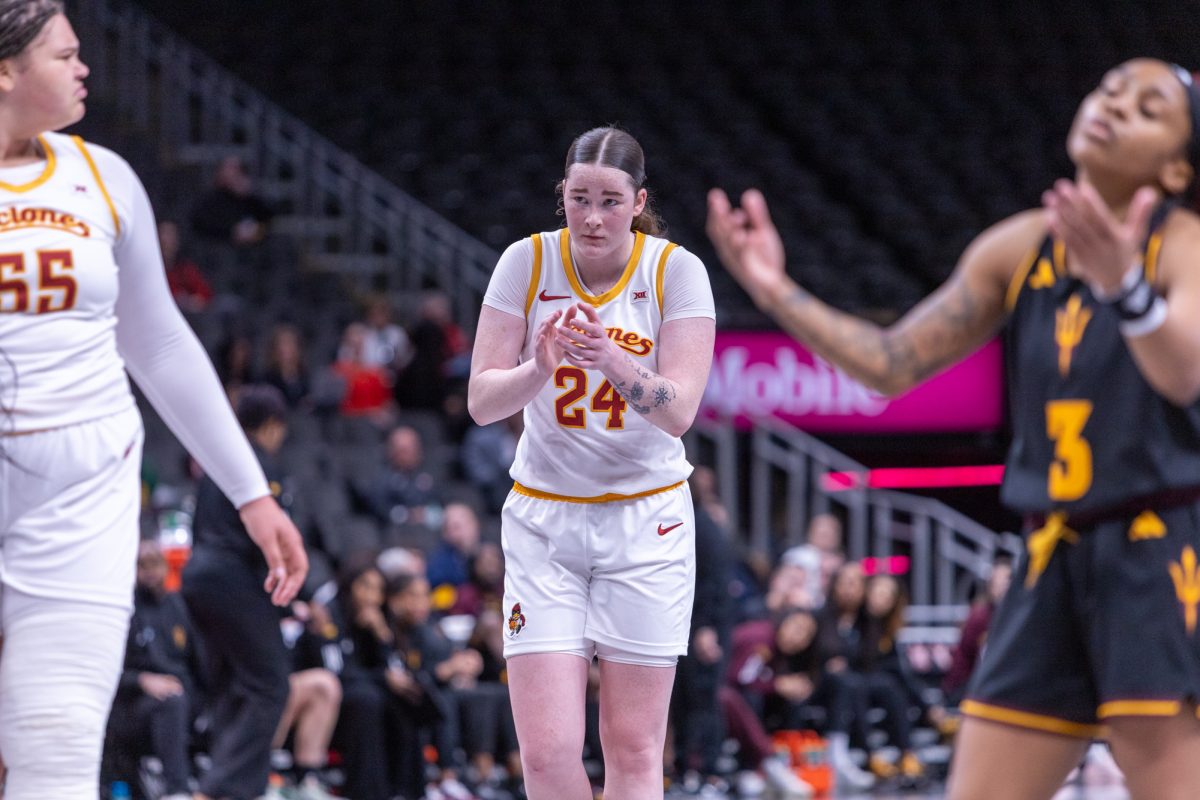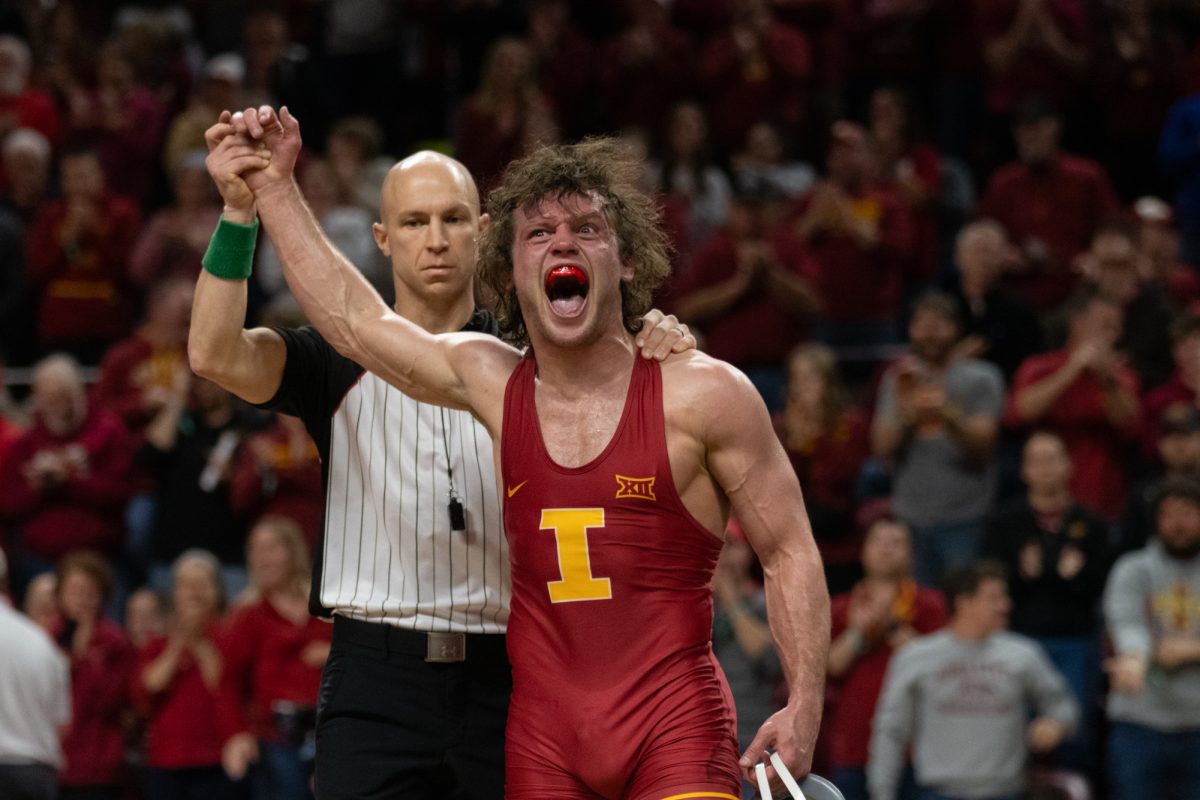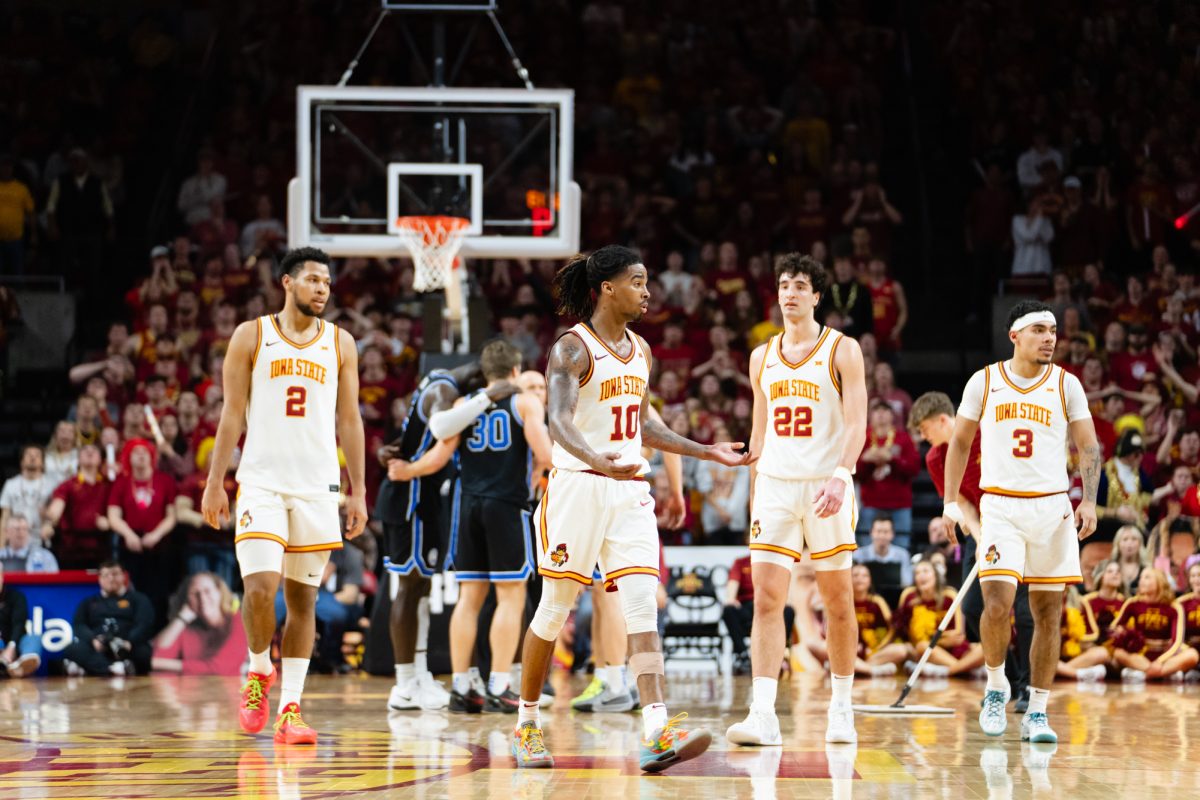The road to recovery
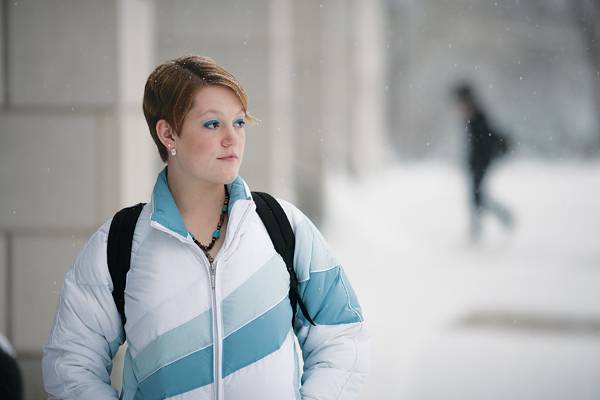
Melissa Bates, junior in Animal Science, watches the snow begin to fall tuesday afternoon in the Library. This is Bates first semester back at Iowa State after being diagnosed and treated for a type of colon cancer that is rarely found in young people. Photo: David Livingston/Iowa State Daily
December 8, 2009
The weakest point in Melissa Bates’ battle against colon cancer struck her as she was interviewed for a TV news special in January.
Zoned out, focused on not breaking down, she answered the questions with a shaky voice. She wanted to participate in the program because she felt she could help other people.
Diagnosed with colorectal cancer Oct. 2, 2008, Melissa was followed by a film crew. The WQAD program discussed the cancer community’s Gilda’s Club and its location in Davenport.
Colorectal cancer is typically found in adults over 50, but Melissa, diagnosed at 20, was about to finish her first round of chemotherapy.
A junior in animal science, Melissa reluctantly left school in November 2008 to live at home in Kewanee, Ill., while being treated in Galesburg, Ill., and at the University of Iowa in Iowa City — a move that forfeited her scholarship money.
At the time of the TV special she was taking time to heal before having surgery in February, after which she would enter another six months of chemotherapy, ending Oct. 10. Melissa had a clean bill of health, and on Nov. 17 a CT scan showed no traces of cancer remained.
After missing nearly two semesters, she was finally able to return to school for the 2009 fall semester — a significant goal of hers.
“I didn’t want to quit to begin with; it was a sense of normalcy for me,” she said.
Upon returning, she immediately approached her professors and lecturers to explain her condition. She warned that she would have to miss Friday classes to receive chemotherapy and worked with her professors to create a make-up plan.
Her literary journalism professor, Erin Wilgenbusch, understood what Melissa was in for — Wilgenbusch previously worked with had a student who had cancer, and her own father is a two-time colon cancer survivor.
“I’ve seen chemotherapy, I understand the toll it takes,” Wilgenbusch said. “Students sometimes say outrageous things to get out of work, but not that they have cancer.”
Wilgenbusch was one professor who worked well with Melissa, although Melissa said not all were so willing.
“Some just treated me like if I got too weak, it was like a cold and I’d be fine the next day,” Melissa said.
Browsing her Facebook page, one would never know she recently beat cancer. Her photos were taken as she hung out with friends at parties, rode her horses and dressed up for a wedding. Only one photo of her sleeping in a hospital bed would hint at an encounter with cancer.
Bates has kept horses for 11 years and has done showings of horses for about six years — mostly in Illinois, but she has gone as far as New Mexico.
“I hope I can get back to showing horses in the summer,” she said. “I haven’t been able to right now because of the medicine I’m on.”
Prior to being diagnosed with cancer, Bates was a normal college student, going dancing with friends, and attending ISU football and basketball games.
The Diagnosis — Beginning in February 2008, she began experiencing most of the symptoms of colon cancer she found online at www.cancer.org. Melissa had been researching her symptoms online and feared the worst. The symptoms lasted several months, but doctors continually told her she was simply a college kid stressing out.
Once she switched to a gastrointestinal specialist, her bad feeling was proven correct: It was colon cancer.
“I was devastated,” Melissa said. “I hoped the doctors were wrong, and I hoped that I was dreaming. I thought I was immediately going to die — that there was no hope for me to have a future.”
While colon cancer is quite rare for 20-year-olds, rates nationally have increased by 5.6 percent per year in women 20 – 29, according to a study in the June issue of Cancer Epidemiology Biomarkers and Prevention.
“I imagine all her family and friends were confused on how someone so young could possibly have this rare cancer,” her father, Roger Bates, said. “Her grandpa had colon cancer, but he was 73 when he’d found out. It’s not the same when your daughter’s only 20 — she has her whole life ahead of her.”
Immediately, her attention turned to the cost of cancer.
“I was freaking out about how we’d be able to afford this,” Melissa said. “But my parents said they’d do whatever it takes.”
This fear grew as her family had to fight with the insurance company, which attempted to cancel its policy because Melissa had left school. She said some of her chemotherapy would have cost $200 per day. She was thankful her family was able to maintain insurance eventually.
Visiting friends and family became a priority while undergoing treatment. Melissa spent her days scrapbooking, visiting her horses and walking her puppy — all the while becoming sicker and weaker. It became a part of her “normal” day.
The Fight — Her family’s faith played a central role during the fight. Prayer chains were started for Melissa. Jesse Larson, campus minister at the Collegiate Presbyterian Church, 159 N. Sheldon Ave., reached out to offer support and stayed in touch with her through e-mail.
“I believe that when we are faced with such scary, life-threatening circumstances, it is very helpful to share these intense burdens with others,” Larson said.
He said there is “nothing fair” about the situation and feels one would need an outlet during such a challenge.
“Simply hiding our grief or putting on a happy face everyday doesn’t allow us to truly deal with what is happening,” Larson said.
Melissa’s 4-H club and former community college, Black Hawk College, put on silent auction fundraisers for her back at home and drew more than 1,000 attendees.
Melissa’s best friend, Amanda Nordstrom, 23-year-old graduate of Augustana College, made a priority to spend as much time as possible with Melissa and was positive that her friend would survive.
“With someone as strong and upbeat as she was throughout this all of this, it was obvious she wasn’t going to admit defeat,” Nordstrom said.
Melissa began going to Gilda’s Club after hearing about it through a social worker. Gilda’s Club allowed Melissa to focus attention on journaling and yoga. Until that point, Melissa always considered yoga to be a “hippie thing.”
Named for famed comedian Gilda Radner, Gilda’s Club was founded by her husband, Gene Wilder, and Joel Siegel and Joanna Bull in 1991. The name came from a quote in Radner’s memoir, “Having cancer gave me membership in an elite club I’d rather not belong to.”
Melissa described it as a place to go to get her mind off of cancer with other sick people, with activities like yoga and support groups.
Each clubhouse is home-like, with designated rooms and times for the various activities and events. The club is dedicated to those whose lives have been touched by cancer — to cope emotionally, which some suggest has an impact on recovery.
Nordstrom would sometimes go with Melissa to Gilda’s.
“As cheesy as this sounds,” Nordstrom said, “watching someone go through this really does inspire you to live and not take opportunities for granted.”
A return to normalcy — While Melissa went through treatments, her side effects would sometimes send her to the hospital. As she finished her last treatment, her health seemed to be in the clear. Then, on Oct. 12, she contracted the H1N1 flu virus and pneumonia, putting her out of school for more than two weeks.
“Chemotherapy takes a lot out of you,” Melissa said. “My immune system was so low. A regular white blood-cell count is 12 to 15. Mine was around three.”
“My initial thought at the beginning was she’d be able to manage, because she’d only miss two or three days for treatments,” Wilgenbusch said. “Then she missed nearly three weeks.”
Wilgenbusch said that, to her surprise, Melissa stayed committed to completing class work.
“I guess I have a little soft spot because of my own experiences,” she said. “But she did as well as anyone else in class.”
While Melissa is healthy once again, she will need follow-ups four times a year right now to monitor for a second cancer. She also fears that her treatment may have jeopardized her fertility, but she remains positive.
“You only have control over so much,” Melissa said.
Roger Bates gushed about the strength of his daughter.
“People were impressed on her positive attitude, which helped her through some trying times,” Roger said. “We’re very proud of her.”
Larson also emphasized Melissa’s courage in the face of cancer.
“I’ve never heard her say anything bitter — she is certainly entitled to be so after having faced so much pain and miserable circumstances — but she focuses on the positive and strives to find joy and hope in nearly every situation she’s in,” Larson said. “Had I gone through a similar situation, I think I would have headed to a beach in Mexico and pitied myself for a few years.”
Melissa now cautions that no one is too young for cancer — if someone has symptoms, they should get checked out.
“Speak up and be heard,” she said. “Most doctors don’t listen to people our age.”
The holidays will mean something different to the Bates family this year. Her father acknowledged the importance they’ve placed on both family and faith, and also on the determination his daughter displayed.
“Keep a positive outlook,” Melissa advised. “No matter how bad the road before you may look. Anything is achievable if you want to work hard to accomplish it.”


